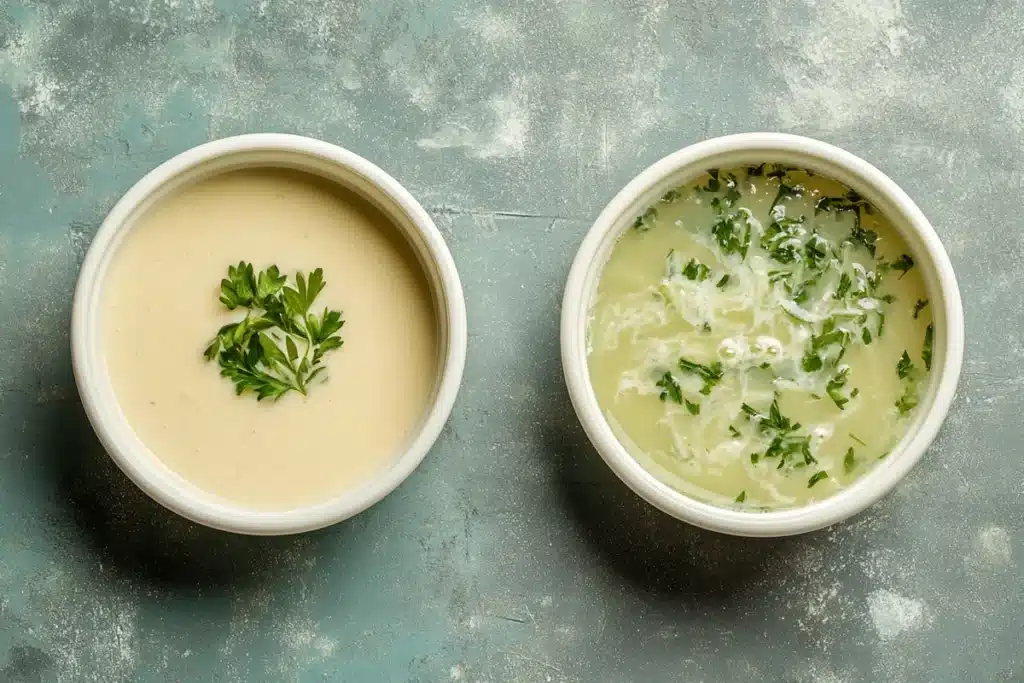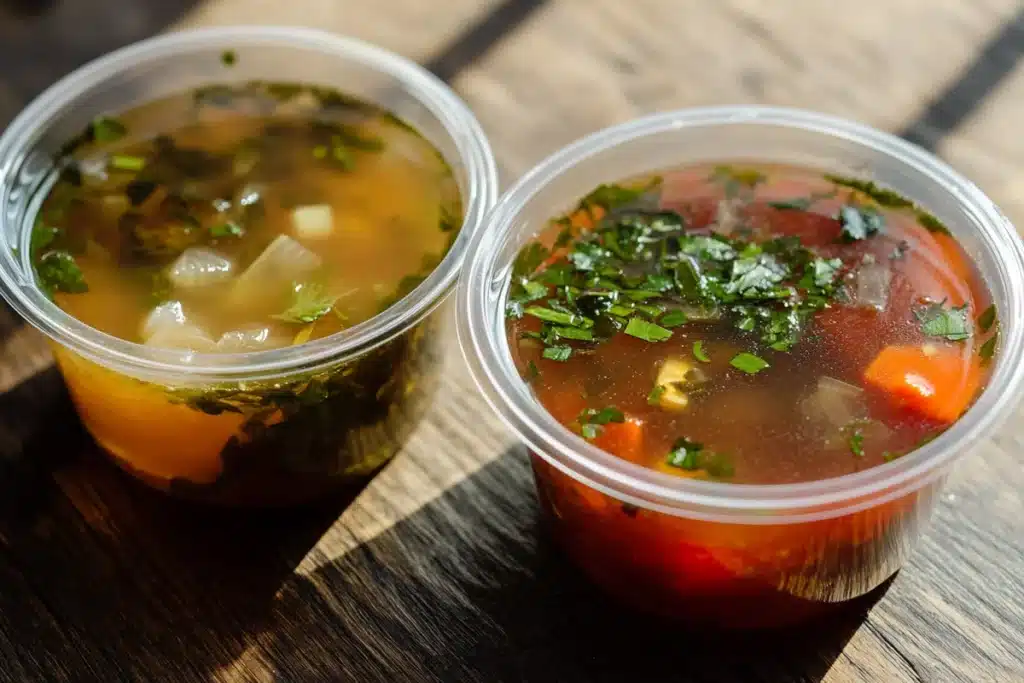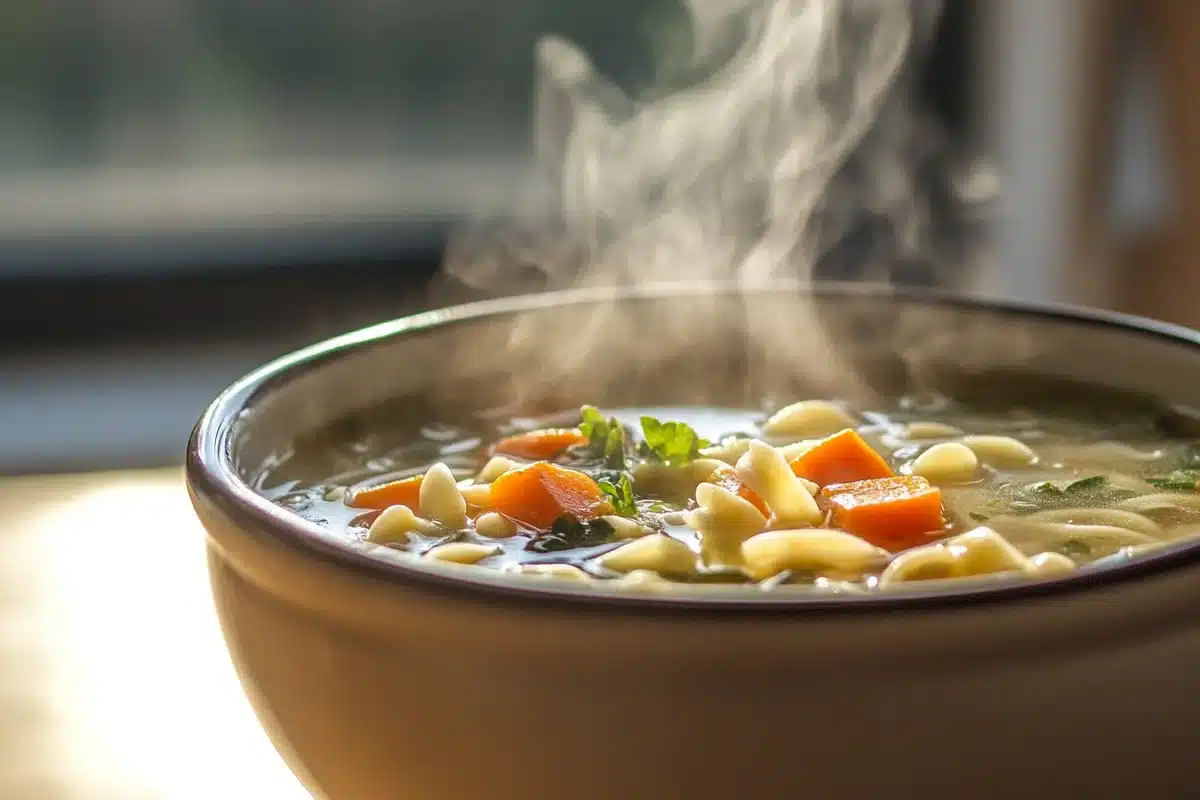This article explains how long you can keep homemade soup in the fridge safely, ensuring your meals are both tasty and secure.
Knowing how long you can keep homemade soup in the fridge is very important for meal planning and safety. Many people enjoy making soup at home, so it’s helpful to know how long it stays good. Therefore, let’s explore the best ways to store soup and how to determine when it’s no longer safe to eat. This guide will help you make the most of your delicious homemade soup.
General Guidelines for Homemade Soup Storage
Generally, homemade soup will last about three to four days in the refrigerator. However, many factors can affect the exact storage time. Therefore, it’s important to understand these factors to make the most of your soup. For example, soup with dairy might not last as long as soup without it. Thus, understanding these guidelines will help you know how long you can keep homemade soup in the fridge.
Factors Affecting Soup Shelf Life
Several things can affect how long you can keep homemade soup in the fridge. The type of soup, how it’s stored, and the quality of the items all play a part. For example, soup with fresh items can spoil faster. Additionally, soup that is not cooled correctly before storage may also not last as long. Therefore, knowing these factors can help you avoid food waste and keep your meals safe. Ultimately, it’s best to be aware of all possible factors affecting soup shelf life.
The Importance of Proper Cooling
Cooling soup properly before refrigerating is vital for its safety. Specifically, you need to cool soup down as quickly as possible before putting it in the fridge. Also, it’s best not to leave it at room temperature for more than two hours. Consequently, this helps stop the growth of bacteria that can make you sick. Thus, fast cooling is essential to keeping your soup safe and ensuring it stays good for a few days. Therefore, always cool your homemade soup properly before refrigeration to make it last.
Specific Types of Homemade Soup and Their Storage
The type of soup you make also affects how long you can keep homemade soup in the fridge. Broth-based soups tend to last longer than cream-based soups. For example, chicken noodle soup or vegetable soup can often keep longer than creamy tomato soup. Accordingly, always keep in mind the different storage times for various kinds of soup. Thus, paying attention to the type of soup you have is key for proper storage.

Broth-Based Soup Storage
Broth-based soups like chicken broth, beef broth, or vegetable broth generally keep well for 3-4 days in the refrigerator. However, always look out for any signs of spoilage. Specifically, a sour smell or slimy texture would indicate the soup is no longer safe. Thus, while broth-based soups are fairly stable, always check them carefully before eating. Therefore, keep in mind that even a soup with a long storage life, like a broth-based soup, needs checking.
Cream-Based Soup Storage
Cream-based soups such as potato soup, tomato soup, or mushroom soup may not last as long as broth-based ones in the fridge. Specifically, these soups usually need to be used within 2-3 days. Additionally, the dairy products can spoil more quickly than broths. Therefore, it’s best to be more careful with cream-based soups and not store them for too long. Thus, be sure to consume cream soups faster than other types for better safety. Knowing how long you can keep homemade soup in the fridge is key for cream-based options.
Soup with Items and Additions
Soup that has a lot of items or additions may also affect how long it lasts. For example, soup with cooked pasta may become mushy quicker. Also, fresh herbs might lose their flavor and break down in soup. Therefore, add some extras later, or be aware of the storage time. Thus, knowing about these changes will help keep your soup at its best for a longer time, while also impacting how long you can safely store it.
Recognizing Signs of Spoilage in Homemade Soup
When storing homemade soup, knowing what to look for if it has gone bad is key. Specifically, there are some very clear signs of spoilage you should be aware of. Therefore, if you notice any of these signs, discard the soup to avoid any risks. Thus, knowing how to check your soup is an important part of food safety. Ultimately, it is best to be aware of any changes in your soup before consuming it.
Visual Indicators of Bad Soup
Visual indicators are one of the most obvious signs that soup is no longer good. First, look out for any mold growth on the surface of the soup. Also, if the soup has a slimy texture, it is a clear sign it has gone bad. Finally, if you see any color changes or unusual cloudiness, discard the soup. Thus, visual cues are extremely helpful in recognizing when soup has gone bad. Therefore, taking a close look before consumption is always a good idea.
The Importance of Smell
Smell is another very helpful indicator of soup quality. Specifically, bad soup will often have a sour or acidic smell. Also, any unpleasant, or “off” odors should raise alarm bells. Therefore, if the soup smells unusual, don’t take the risk of eating it. Thus, the smell of soup is very important when it comes to food safety. Ultimately, if the smell is off, it’s not worth the risk of consuming it. Therefore, always trust your nose when deciding if soup is good.
A Taste Test (Use Caution)
If you are unsure after checking for visual signs and smell, a tiny taste can help, but proceed with great caution. Specifically, if the soup tastes sour, or off, do not eat any more. Also, a bad taste is another clear indication that the soup has gone bad. Therefore, always taste just a tiny bit, if you absolutely have to check the soup. Thus, if the taste is not good, then the soup should go into the garbage. Ultimately, your senses are your guide to deciding if the soup is safe.
Best Practices for Storing Homemade Soup in the Fridge
Following best practices is vital when you consider how long you can keep homemade soup in the fridge. Proper cooling, storage methods, and container choice all help to keep soup safe for longer. Therefore, be aware of the best storage tips for homemade soup. Thus, learning these practices can help keep your food safe.

Cooling Soup Quickly and Safely
Cool soup down rapidly before placing it in the fridge. Specifically, use shallow containers and never let soup sit out at room temperature for more than two hours. Also, an ice bath can help to speed up the cooling. Therefore, it’s crucial to cool soup safely to stop bacteria growth. Thus, these cooling methods will improve the quality of your stored soup. Ultimately, rapid cooling enhances safety.
Choosing the Right Storage Containers
Storing soup in airtight containers helps it stay fresh and safe. Specifically, use containers that are designed for food storage and free from any cracks or damage. Also, glass containers work very well for soup. Therefore, suitable containers help protect soup from fridge odors and keep it fresher. Thus, selecting good containers is an important step in storing soup. Ultimately, good containers help maintain the soup‘s quality.
Portioning Soup for Storage
Portioning soup into smaller containers is a very good way to help it cool more quickly and also makes serving easier. Specifically, smaller portions cool faster in the fridge, reducing the time they spend in the danger zone. Also, these small portions make it easier to grab what you need. Therefore, portioning soup is a practical way to enhance both storage and meal prep. Thus, smaller portions are very helpful for both safe and convenient storage. Ultimately, this portioning makes your life easier.
Freezing Homemade Soup for Longer Storage
If you know you won’t eat your homemade soup within a few days, consider freezing it. Freezing soup is a good way to make it last longer. Specifically, most soups freeze well for several months, while maintaining their quality. Therefore, freezing is a great way to preserve your delicious homemade soup. Thus, this option is useful for extending your soup‘s lifespan. Ultimately, freezing can keep your soup good for an extended amount of time.
Best Practices for Freezing Soup
Use freezer-safe containers when storing soup in the freezer. Specifically, ensure to leave some space at the top of the container because the soup will expand when frozen. Also, label your containers with the name and date for easier use. Therefore, using proper containers and labeling are crucial for freezing soup. Thus, good preparation will help your frozen soup last longer and stay more organized. Ultimately, these best practices will improve the long term safety and quality of your frozen soup.
Thawing and Reheating Frozen Soup
When thawing frozen soup, do it slowly in the fridge overnight. However, if you need to thaw it more quickly, you can do it on the stove top or in the microwave using a low setting. Specifically, always ensure the soup reaches a temperature of 165°F to eliminate bacteria. Therefore, thawing and reheating soup properly is key to its safety. Thus, be very careful when thawing and reheating soup from the freezer. Ultimately, proper thawing and reheating will make your frozen soup safe.
Tips for Extending the Life of Your Homemade Soup
Besides proper storage, there are additional ways you can help to extend the good life of your homemade soup. Choosing the right items, adding fresh additions at the proper time, and how often the fridge door is opened can all make a difference. Therefore, a few extra tips are always useful. Thus, being aware of these simple tricks will help you extend the life of your soup. Ultimately, these additional steps can help your soup last longer.
Choosing the Correct Items
Using fresh, high-quality items from the start will make your soup last longer. Specifically, using older or damaged items can reduce the overall storage time of your soup. Also, using fresh items helps in making a tastier and a safer soup. Therefore, always choose fresh items to make soup. Thus, high-quality items make for a better soup experience. Ultimately, using fresh items will help make your soup last a little longer.
Adding Fresh Herbs at the Right Time
Adding fresh herbs can enhance the taste of your soup. However, these can sometimes reduce the storage life. Specifically, fresh herbs often break down in liquid. Also, these can affect the overall quality of your soup if added too early. Therefore, it’s better to add fresh herbs just before serving. Thus, by adding the herbs late, you can make sure that your soup will stay good for a longer time. Ultimately, timing herb addition is important.
Limiting Refrigerator Door Openings
Every time you open the refrigerator door, the temperature inside can change. Specifically, these shifts in temperature can affect how long your soup stays good. Also, keeping the door closed keeps the internal temperature more stable. Therefore, try to open your fridge less often. Thus, limiting these openings will help to keep your soup at the correct temperature for better storage. Ultimately, keeping the door shut makes soup last a little longer.
Conclusion
In conclusion, while the general guideline is that homemade soup lasts 3-4 days in the fridge, several factors can affect this. Understanding how long you can keep homemade soup in the fridge is very important. Always check for signs of spoilage and store soup correctly. Therefore, following food safety best practices is essential for enjoying your soup. Thus, being aware of these storage practices will help you make the most of your delicious homemade soup safely. Ultimately, proper storage is the key to enjoying homemade soup.
Frequently Asked Questions (FAQs):
Can I eat soup that has been in the fridge for a week?
It is generally not recommended to eat soup that has been in the fridge for a week. While some soups might still be good, the risk of spoilage and foodborne illness increases significantly after four days.
How long can homemade vegetable soup last in the fridge?
Homemade vegetable soup typically lasts three to four days in the fridge. However, it’s very important to check for any signs of spoilage before eating. Specifically, always prioritize safety with any homemade items.
Can you eat week old homemade soup?
It is not advisable to eat week-old homemade soup. The risk of bacterial growth and food poisoning increases greatly after the recommended 3-4 day storage time.
How can you tell if soup has gone bad?
You can tell if soup has gone bad by checking for several signs. Look for a sour smell, slimy texture, mold, or any unusual color changes. If the soup looks or smells off, then discard it.


1 thought on “How Long Can I Keep Homemade Soup in the Fridge?”